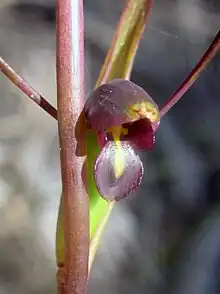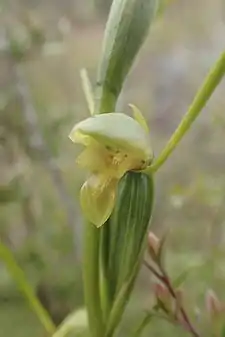| Bird's-mouth orchid | |
|---|---|
 | |
| Orthoceras strictum in Ku-ring-gai Chase National Park, Australia | |
| Scientific classification | |
| Kingdom: | Plantae |
| Clade: | Tracheophytes |
| Clade: | Angiosperms |
| Clade: | Monocots |
| Order: | Asparagales |
| Family: | Orchidaceae |
| Subfamily: | Orchidoideae |
| Tribe: | Diurideae |
| Genus: | Orthoceras |
| Species: | O. strictum |
| Binomial name | |
| Orthoceras strictum | |
Orthoceras strictum, commonly known as the bird's-mouth orchid[2] or horned orchid,[3] is a species of orchid native to eastern and southern Australia, New Zealand and New Caledonia. It has between two and five linear leaves and up to nine yellowish green, brownish or blackish flowers with two long, erect to spreading lateral sepals.

Description
Orthoceras strictum is a terrestrial, perennial, deciduous, herb with an underground tuber and a tuft of between two and five linear to thread-like, grass-like leaves, 150–300 mm (6–10 in) long and 2–3 mm (0.08–0.1 in) wide. Up to nine flowers 8–10 mm (0.3–0.4 in) wide are borne on a rigid flowering stem 300–600 mm (10–20 in) tall. Flower colour varies from blackish, brownish, maroon to yellowish green. The dorsal sepal is egg-shaped and forms a hood over the rest of the flower, 9–12 mm (0.4–0.5 in) long and 8–10 mm (0.3–0.4 in) wide. The lateral sepals are linear, horn-like, 20–25 mm (0.8–1 in) long, about 1 mm (0.04 in) wide and erect, spreading or curved. The petals are oblong, 8–10 mm (0.3–0.4 in) long, about 3 mm (0.1 in) wide and hidden inside the dorsal sepal. The labellum is 6–10 mm (0.2–0.4 in) long and has three lobes. The middle lobe is elliptic to egg-shaped, 6–7 mm (0.2–0.3 in) long, 5–6 mm (0.20–0.24 in) wide and the side lobes are 5–6 mm (0.20–0.24 in) long, about 1.5 mm (0.06 in) wide. There is a pyramid-shaped callus near the base of the labellum. Flowering occurs from November to February.[2][3][4]
Taxonomy and naming
Orthoceras strictum was first formally described in 1810 by Robert Brown and the description was published in his book Prodromus Florae Novae Hollandiae et Insulae Van Diemen.[5][6] The generic name (Orthoceras) is derived from the Ancient Greek words orthos meaning "straight"[7]: 578 and keras, keratos meaning "horn,[7]: 422 which alludes to the upright lateral sepals.[8] The specific epithet (strictum) is a Latin word meaning "straight" or "tight".[7]: 760
Distribution and habitat
The bird's-mouth orchid is widespread but uncommon and occurs in New South Wales, Queensland, South Australia, Tasmania, Victoria and New Caledonia. It grows in a wide range of habitats from grassy forest to heath. The differences between this species and Orthoceras novae-zeelandiae from New Zealand are "very slight and dubious".[9]
Conservation
Orthoceras strictum is listed in Tasmania as "rare" under the Tasmanian Government Threatened Species Protection Act 1995.[10]
References
- ↑ "Orthoceras strictum". World Checklist of Selected Plant Families (WCSP). Royal Botanic Gardens, Kew.
- 1 2 Bernhardt, Peter. "Orthoceras strictum". Royal Botanic Garden Sydney. Retrieved 17 March 2018.
- 1 2 Ohlsen, Daniel. "Orthoceras strictum". Royal Botanic Gardens Victoria. Retrieved 17 March 2018.
- ↑ Jones, David L. (2006). A complete guide to native orchids of Australia including the island territories. Frenchs Forest, N.S.W.: New Holland. p. 283. ISBN 1877069124.
- ↑ "Orthoceras strictum". APNI. Retrieved 17 March 2018.
- ↑ Brown, Robert (1810). Prodromus Florae Novae Hollandiae et Insulae Van Diemen. London. pp. 317–318. Retrieved 17 March 2018.
- 1 2 3 Brown, Roland Wilbur (1956). The Composition of Scientific Words. Washington, D.C.: Smithsonian Institution Press.
- ↑ Les Robinson - Field Guide to the Native Plants of Sydney, ISBN 978-0-7318-1211-0 page 251
- ↑ "Orthoceras novae-zeelandiae". New Zealand Plant Conservation Network. Retrieved 17 March 2018.
- ↑ "Orthoceras strictum - horned orchid". Tasmanian Government Department of Primary Industries, Parks, Water and Environment. Retrieved 17 March 2018.
External links
 Media related to Bird's-mouth Orchid (Orthoceras strictum) at Wikimedia Commons
Media related to Bird's-mouth Orchid (Orthoceras strictum) at Wikimedia Commons Data related to Bird's-mouth Orchid (Orthoceras strictum) at Wikispecies
Data related to Bird's-mouth Orchid (Orthoceras strictum) at Wikispecies